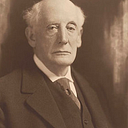Goldwater’s Warning to GOP Came True
Barry Goldwater, the 1964 Republican nominee for President, was known as Mr. Conservative. But his widely acknowledged brand of conservatism was nothing like what passes for conservatism today. Books, plays, documentaries, news articles all referred to Goldwater by that same nomenclature. Goldwater’s own exposition of his political agenda was called, The Conscience of a Conservative. He was the epitome of conservatism then.
Ronald Reagan gave a key address in 1964 announcing he was no longer a Democrat and extolling the virtues of Goldwater as a conservative.
But there was a problem with conservatives in general that free market Nobel Laureate F.A. Hayek pointed out in his The Constitution of Liberty:
I say that the conservative lacks principles, I do not mean to suggest that he lacks moral conviction. The typical conservative is indeed usually a man of very strong moral convictions. What I mean is that he has no political principles which enable him to work with people whose moral values differ from his own for a political order in which both can obey their convictions.
As I see it a principle is rationally held where “moral convictions” are often merely asserted. The former are based on evidence and logic while the latter can merely be blind revelation.
What dominated conservatism was fear, especially fear of change. Hayek wrote, “Conservatives feel instinctively that it is new ideas more than anything else that cause change. But, from its point of view rightly, conservatism fears new ideas because it has no distinctive principles of its own to oppose to them…” All change to these types of conservatives means a fear of freedom — especially fearing the freedom of others.
For most conservatives this meant making religious assertions based on their own whims and interpretations of the Bible and then demanding these convictions be imported into the legal system and imposed on everyone else. They don’t want religion free from state control or the state free from religious control. They want to use state power to impose their religion and ultimately destroy the rights of other belief systems or faiths.
Right-wing theocrat Gary North openly bragged about this. He said the Religious Right “must use the doctrine of religious liberty” only in the meantime but when able “get busy in constructing a Bible-based social, political and religious order which finally denies the religious liberty of the enemies of God.” Of course, by “enemies of God” he means anyone he didn’t like and made it clear many of them would ultimately have to be stoned to death.
When Goldwater ran in ’64 writer/philosopher Ayn Rand warned him about the Religious Right — a warning we will see he repeated later. She told him William Buckley and his publication were attempting “to tie Conservatism to religion, and thus to take over the American Conservatives.” She said until the late 1940s she didn’t “take the issue of religion in politics seriously, because there was no such threat. The conservatives did not tie their side to God” and there was no serious attempt to for them to base their “case on faith.”
The Goldwater who Reagan defended was more principled than motivated by faith and he recognized politics meant compromise.
Reagan drifted to a more middle position between the Religious Right and traditional conservatism. His motive for wasn’t to impose religion on others but he felt it was a good strategy to build the Republican Party. He thought he could use them for his goals not realizing in the end they would use his party for their goals.
In 1981 Senator Goldwater warned the Senate and his own party that the Religious Right was after power, not liberty. He said the traditional conservative view was “a deep, abiding respect for the Constitution… [and] the freedom that document protects.” But something was now happening: “The specter of single issue religious groups is growing over our land.”
He went into detail and I bow to his remarks:
One of the great strengths of our political system always has been our tendency to keep religious issues in the background. By maintaining the separation of church and state the United States has avoided the intolerance which has so divided the rest of the world with religious wars. Throughout our 200-plus years, public policy debate has focused on political and economic issues, on which there can be compromise.
…in a well-constructed representative government like ours, Madison said, one of our greatest strengths is our ability to “break and control the violence of faction.”
What he said is that the aim of the framers of the Constitution was to allow freedom of religion and freedom of speech for everyone, not just those who follow one religious faction.
…Our political process involves a constant give and take, a continuous series of trade-offs. From this system of compromise, we get legislation that reflects input from many sectors of our society and addresses many needs and interests. Obviously, not everyone can be pleased, but at least all sides are considered.
However, on religious issues there can be little or no compromise. There is no position on which people are so immovable as their religious beliefs. There is no more powerful ally one can claim in a debate than Jesus Christ. Or God, or Allah, or whatever one calls his supreme being.
But, like any powerful weapon, the use of God’s name on one’s behalf should be used sparingly.
The religious factions that are growing throughout our land are not using their religious clout with wisdom. They are trying to force government leaders into following their positions 100 percent.
In the past couple years. I have seen many news items that referred to the moral majority, pro-life and other religious groups as “the new right,” and the “new conservatism.” Well. I have spent quite a number of years carrying the flag of the “old conservatism.” And I can say with conviction that the religious issues of these groups have little or nothing to do with conservative or liberal politics.
The uncompromising position of these groups is a divisive element that could tear apart the very spirit of our representative system, if they gain sufficient strength.
Goldwater was right, this theocratic movement was neither traditional conservatism nor liberalism—either traditional or progressive. It was hard-core authoritarianism wanting to stamp out not just religious freedom, but freedom in general. They want a nation where the most intolerant factions of evangelicalism control the private lives of every American. It is nationalizing our social realm, a form of socialism of the soul. For good measure they want a regimented market to prevent the production of sinful products or challenges to their “morality.”
I was thinking of remarks made by Baptist theocrat Richard Angwin, who taught at the Bible college I attended. He went on to lead vicious anti-gay campaigns and then went around telling evangelicals how they could do the same. He had one strong word of advice — don’t tell people the truth about all your goals. Take what you can and then demand more and more and more until you have an unfree “Godly” society imposed on all by the force of law.
Today’s Republicans are not traditional conservatives. The past they yearn for is not the values of the Constitution or the Declaration of Independence. No, the past they yearn for is more like that found under the Mussolini dictatorship.
The desktop used to prepare this page and our other pages is past its use-by date with an operating system that is running into lots of problems, especially in opening other sites for research. We need to raise $315 to cover the remaining costs to replace it. Please make a donation if you can through PayPal to jperon29palms@gmail.com. Any excess funds will be donated to World Central Kitchen. Even small donations help.

